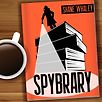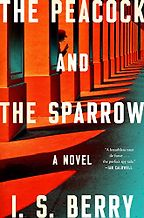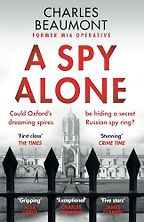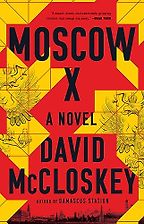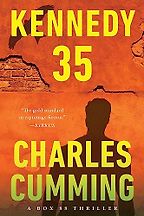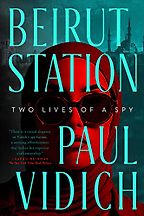What was 2023 like for spy thrillers? Looking through the books you’ve recommended, it seems like it was a pretty good year.
It was a phenomenal year! We have lots of discussions among Spybrary listeners. Most of them say we haven’t had a year like this since the late 1970s. There were so many great spy thrillers published, some people had difficulties getting to all the books that are out there.
Even I’ve struggled this year. There are a few spy thriller authors that I’d normally read right away that I just haven’t had the time to get to. That’s pleasurable. I’d rather it be that way than the cupboard is bare.
2023 truly has been a bumper year.
What kind of qualities are you looking for in a good spy thriller?
When we talk about this at Spybrary it can be quite contentious at times. I feel there are a lot of books out there that masquerade as spy thrillers but are basically shoot-’em-ups.
The books I want to chat with you about today are what I consider the more realistic—yet still thrilling—spy novels. These aren’t big car chases or running across rooftops and firing AK-47s. This is what I would call true spy fiction. It’s classic spy fiction, which is more (dare I say it) cerebral, and more realistic. In fact, out of the five I suggest today, three are by serving or ex-intelligence officers: two for the CIA; one for MI6. I want to make it clear that that is the side of the aisle of the spy fiction genre that I prefer.
Do you get the sense, then, that these give an insight into what it’s actually like to be working as a spy?
They would all say no, because Charles Beaumont has signed the Official Secrets Act and, from what I understand, MI6 were none too pleased about him publishing his work of fiction. The US is different, in that a CIA officer can have their career declassified.
In the UK we don’t have that. Our intelligence services don’t really want former employees writing spy novels, whereas in the US there seems to be a different appetite for it. In fact, we discovered in an interview I held with IS Berry (who wrote The Peacock and the Sparrow) that there’s an organisation within the CIA called ‘Invisible Ink.’ They’re all budding writers who are working on novels and supporting each other.
Of course, each writer has their own spin on it, and you may have some ex-CIA who will write the more action-type of spy novel. But in the case of IS Berry and David McCloskey it’s very much the realistic spy tale.
I was reading McCloskey’s Damascus Station earlier this year and enjoyed it so much that I even read the acknowledgments. At the back, he writes, “for all its warts and complications, I love and admire the CIA and hope that readers of this novel will come away with a deeper understanding of its Mission and the sacrifices made by its officers to protect America and her way of life.” There’s an educational element. We have stereotypes of the CIA, he’s trying to give a more subtle sense of what it’s about.
I agree. Part of the fascination of the spy thriller is that it is this shadowy world that very few of us are ever going to exist in or know much about. If we wanted to, we could all train to become a private detective or a police officer. But not many of us will be handpicked by MI6 or the CIA. I think that’s why so many of us enjoy reading about this secret world.
I often say that when I read Ian Fleming I want to be a secret agent—it’s so glamorous and adventurous—and when I read John le Carré I want to be an accountant. It’s a very, very different read. You just can’t imagine yourself wanting to work in that environment. You literally can’t trust anybody. There is huge manipulation. Spies need information from an informant or a source and have to manipulate them in many different ways. I think IS Berry does a really good job of depicting that in The Peacock and the Sparrow.
On that note, let’s turn to her book, which is the first on your list of best spy thrillers of 2023. So it’s set in Bahrain and it’s about an ageing CIA case officer during the Arab Spring—tell me more.
Which is a familiar trope! A lot of the spies in the realistic books are washed up, weary spies coming to the end of their tenure. The writing in this book has a lyrical quality. It’s very reminiscent of Graham Greene’s The Quiet American, which she says is her favourite book. It’s different, but it’s definitely a love letter, an homage to that work.
IS Berry sets the scene with Shane Collins, who is a CIA operations officer on his final mission. I like the ethical dilemmas. He could just see his last mission out and go home, but things happen and he says, ‘No, I’m actually going to stand for something this time.’ Immediately — even though you might not think a great deal of this womanising, alcoholic spy — he does have these redeeming features that make you want to root for him.
One of the reasons I love IS Berry’s work is the way she describes the lives of diplomats and being based overseas. There’s Rod Stewart music being played and karaoke, and it seems that everyone’s getting drunk all the time. It almost seems like a parody. She says, ‘No, that pretty much was my impression of expat diplomat life in some of the stations where I was based.’
As you mentioned, the book is set in Bahrain which is interesting because often spy books are set in places like Berlin or London. It’s a good depiction of Bahrain and its culture. She writes about the dividing line between the ruling class and the poverty that’s in Bahrain, not something we tend to think about a great deal.
She is also able to weave in geopolitics, with the threat of Iran supporting a revolution in Bahrain against the ruling family. Who are the Americans backing? What’s actually happening with the terrorist cells? How serious are these terrorists in Bahrain (with her love of Graham Greene and Our Man in Havana, you also can’t help but wonder)? All this is set against the backdrop of the Arab Spring.
There are a lot of threads that IS Berry weaves into the book. I think even people who aren’t into spy novels will enjoy this book because of the story. It’s not just about espionage, it’s about the human condition, set against a backdrop of political turmoil, and a journey of personal discovery by a flawed main protagonist.
One thing I like about spy thrillers is they can be a great way of learning about geopolitics. To read a story set there and get completely involved in it is more fun than reading about Bahrain in The Economist, say.
It is. Also — and I’m particularly thinking of Paul Vidich with Beirut Station, and David McCloskey’s Damascus Station — I always get very hungry reading these books. They’ll start describing Lebanese cuisine, and I’ll think, ‘Oh, I can’t get that around here! This sounds like it’d taste amazing.’ I think bringing in the exoticism of the location, rather than rainy Berlin, also adds a lot to these books.
Let’s go to your next choice, A Spy Alone, which is about a spy ring in Oxford.
A Spy Alone is a debut novel by Charles Beaumont (not his real name), an ex-MI6 operative. Everyone knows about the Cambridge spy ring from the 1950s. His premise was, ‘What if there was one in Oxford?’ When I first heard about the book, I remember thinking, ‘I don’t know if this is really going to work for me,’ but then I realised he’s setting it in the modern day.
The first question I had as a reader was, ‘Why on earth would anyone want to be a spy for Putin right now?’ In the days of Philby — love him or loathe him — there was ideology: they were all fervent antifascist communists. Philby was still a traitorous so-and-so, with a lot of blood on his hands, but he had an ideology.
I wondered, ‘How is Beaumont going to create a spy ring that’s believable?’ I don’t want to go down Spoiler Straße — and that’s always very tricky, talking about spy thrillers, because they’re always going to have lots of twists and turns — but he’s given reasons why some of these Oxford students would be working for Russia, and these are actually very credible.
It’s not a surprise when you look at Charles Beaumont’s background — the little that he’s shared. He has served in war-torn places, and he’s seen how things have gone down. He’s taken his geopolitical knowledge and created these characters. I really like what he’s done with it. You have a professor based at Oxford who’s basically a spotter for talent, looking for people who might be able to serve Russia.
The main protagonist is an ex-spy, who has left the service and is down on his luck a bit, financially. There’s a lot of tradecraft. The detailed descriptions of spy techniques provide an educational aspect to the reading experience. I’m a fan of the classic espionage novel where the spy has to rely on his or her guile and cunning and wit, rather than a gun of some sort or the instant cavalry arriving, and that’s what you get.
There is a scene very early on in the book where we get the protagonist’s backstory. He’s giving a speech to a private concern on security, and he says, ‘This is the speech he really wished he could have given’ and he talks about his background in the intelligence services. That was a really good way of covering a lot of the backstory.
The political among us will be trying to guess who the characters in the book are based on. I don’t want to say their names because I don’t want to get sued and I don’t want to ruin the book, but it’s fun trying to guess who everyone in the Oxford Spy ring could be.
Let’s go on to Moscow X, by David McCloskey. His debut novel, Damascus Station, was brilliant: this is his second. Tell me what it’s about and why you liked it.
Moscow X starts slowly and then accelerates into a fast-paced thriller. We have the return of Artemis Proctor, who was in Damascus Station. The book opens in a quite dramatic fashion, where she finds herself in a very compromised position. I won’t ruin it for readers, but she’s immediately defrocked and sent back but she wants to get back in the game.
They throw her this project, which is an operation of mind games and trickery. It all revolves around Russian money and oligarchs and the West (or the CIA, in this case) trying to come up with a scheme that will have them all stabbing each other in the back and going after each other. So, a very carefully constructed plot by McCloskey.
What I particularly like is there are a large number of scenes about horse breeding. One of the Russians involved runs what they call RusFarm near St Petersburg. Then there is a CIA-backed horse farm in Mexico. How much of this is reality or not, we’ll never know. But it’s still fun to imagine that the secret services are putting businesses together as fronts. For the man who runs the farm in Mexico, the CIA recruited his grandfather first and it’s come down through the generations. He’s sent out to Russia with another agent, to RusFarm, to spy on the protagonists there.
I know nothing about horses and horse breeding, but what McCloskey was able to do was write about them in a way that was engaging. It reminded me a bit of Ian Fleming. Say the bridge scene in Moonraker. I have never played bridge in my life, but he is able to write about it in a way that, even if you’re not familiar with the game, you can follow the tension of the moment. I thought McCloskey did a really good job on that. Apparently, he researched with horse breeders in Kentucky—maybe that’s why he was able to write about it for the layperson, because he was once one himself.
The two main characters in Moscow X are both spies for the CIA and go undercover to RusFarm. There’s one line which shows just how tough it is to be a spy: they’re told, ‘Look, there are going to have cameras in your rooms. You’ve got to pretend to be a couple.’ Which means making love to each other even though they’re not partners. They have to do this. Again, you just scratch your head and think, ‘I could never be a spy!’
I liked the insight into the Russian goings-on in the book, including the descriptions of London’s financial dealings and Putin’s villa on the Black Sea. Also, that line: “A traitor and a hero. I am both…Like all good Russians.” How do you think the book compared to Damascus Station?
It had a different pace. The first half of Moscow X was a bit of a slow burn. There was a lot of set-up, but there was the payoff. I like slow burns.
On Spybrary we often joke that the Brits write the best realistic spy novels, but the Americans are really starting to stake their claim. Three of the writers I’ve chosen (Vidich, McCloskey, and Berry) are American. I might offend some Americans, but they are writing in a British style of espionage, where there aren’t the high-speed car chases and the mass deaths: it is more of an intricate, slow burn.
It’s interesting to see that, because my analysis of book sales in the US is that shoot-’em-up books sell a lot more. If you’re a writer who wants to make a ton of money writing spy novels, realistic is probably not the way to go. So we’re very lucky that these authors have picked this genre and are doing well in it. We’re blessed to have them.
Also, I just like books, and I tend not to look at gender, but we must be honest that in the spy genre the vast majority of authors are men, and the vast majority of heroes are men. So it’s refreshing to see IS Berry come along. There are others, like Alma Katsu, as well. It’s really good to see these authors write about spies, not just because they’re women but because they happen to write bloody good spy novels.
Are you seeing more China-related spy novels?
Since Adam Brookes’s Night Heron trilogy, not so many. The one that’s always talked about is Charles Cumming’s Typhoon, but that’s from 2008. I do hear on good authority that McCloskey is considering North Korea and China as the setting for a future book, though.
Let’s go on to Charles Cumming’s latest book, Kennedy 35. It’s set in Senegal and is partly about the aftermath of the Rwandan genocide. I really felt like I was in Dakar, going out to dinner at a restaurant. He does a great job of taking you there, doesn’t he?
Yes, and Charles has done a fair bit of research. I saw his photographs from Senegal. I think both he and Vidich are great at transporting us to locations. Even though I’ve never been to Senegal or Beirut, I felt it was authentic, the way they described the food and the smells and the nature and the landscape.
Kennedy 35 is the third in the Lachlan Kite series, and I feel Cumming has found his feet with this one. The other two were good; I enjoyed them. It was notable that this one was a smaller book, so a faster read, because Box 88, the first one, was quite chunky.
I like the two timelines. I’ve learned in our Spybrary community that some readers struggle with two timelines, but Cumming has a knack for being able to fuse them together in a way that they’re not jarring, and you know where you are. A good device he has to remind us of what era we are in is that when he goes back to the 1990s, he writes about music that was very much of its time playing in the bar. I thought that was a fun way of doing it. Both timelines are very interesting, very intriguing. It’s almost like you’re getting two books for the price of one—two good books.
We see Lachlan Kite in Senegal in the 1990s. His girlfriend is very ill. They’re involved in a stakeout—they’re going to snatch a war criminal from Rwanda. There are plenty of twists and turns. You’re worried about how that snatch is going to go and also what’s happening with his girlfriend, in the middle of Senegal, very ill. Then you’re smack-bang in the modern-life timeline. Having built up the character, he’s very good at fusing the two timelines.
I think, in some ways, this is lazy reviewing, but some people talk about Cumming as ‘the next le Carré’ or ‘in the footsteps of le Carré’. Le Carré was famous for building up this whole world and creating his own vocabulary for it. ‘The Circus’ was the head office of the Secret Service at the time; the Lamplighters were the technicians; and there are the scalphunters. Cumming does this as well. I should probably write up a glossary of all the different words and terms he’s using.
I’ve seen more and more spy writers do this. Charles Beaumont does it in his book as well. I love it because it’s building that whole world for us to go and explore—a world that we’ve never been privy to.
What kind of vocabulary does Cumming use?
The Cathedral, for instance, is the nickname of the London headquarters for his agency. Falcon are the surveillance specialists. The Closers is the military arm. I really get excited when spy authors do this and create their own worlds.
We’re now at book number five, which is Beirut Station, by Paul Vidich. You already said a little bit about it but tell me more. This is by an author whose background isn’t in spying, but it’s his sixth novel.
Paul Vidich is so good. That’s what I enjoy most about doing the Spybrary podcast. People write to me and say, ‘I would never have discovered Paul Vidich if it wasn’t for you and now I can’t get enough of it.’
I picked this book up at Heathrow airport. I had been planning to watch movies on the flight but I inhaled this book instead. I just couldn’t put it down. It’s a thought-provoking and intense spy novel and I just wanted to finish it.
The book is set during the Israeli-Hezbollah war in 2006. The events depicted are fictional but revolve around historical incidents, including the tragic murder of the CIA station chief, William Buckley, in Lebanon in 1985. They’re hunting for the assassin. The surveillance is run jointly by CIA and Mossad and Paul comes up with different characters for the different agencies.
Condoleezza Rice is visiting and there is a lot of worry that she is going to be assassinated by Hezbollah. There’s a lot of tension around her visit. A bit like IS Berry, Vidich is very good at weaving real-life events and geopolitics into the backdrop of the story. It makes the book educational as well as entertaining.
The main protagonist is Analise Assad, a Lebanese-American CIA agent. She’s not the usual downtrodden woman that you often see in spy novels. She’s a ‘NOC’ (non-official cover), which means she’s totally undercover and works for the UN Refugee Agency as a teacher. Her job is to befriend the grandson of the terrorist chief and get to him through the boy. As you can imagine, in a lot of these books there are moral dilemmas. You can ask, ‘Is that the right thing to be doing—to be using a kid to try and murder the grandfather?’ Vidich does this very well.
Analise is a very strong woman, but not in the same way as Artemis Proctor in Moscow X or Shirley Dander in Mick Herron’s books. Analise is a very thoughtful, intelligent officer who’s used to getting information that others may miss. For instance, when they’re tracking the villain, she notices that the one thing that’s constant with the driver is that he wears the same gloves. It’s a vanity thing. Everything else changes, but the gloves are the same. I don’t want to go into why that’s important, but she’s able to go in and pick out this information that’s crucial for them in their mission.
Five Books aims to keep its book recommendations and interviews up to date. If you are the interviewee and would like to update your choice of books (or even just what you say about them) please email us at [email protected]
Five Books interviews are expensive to produce. If you've enjoyed this interview, please support us by donating a small amount.

